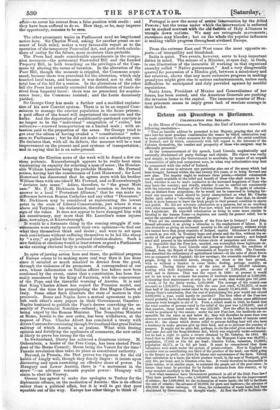In spite of jarring action here and there, the political
progress of Europe seems to be making more real way than it has done since it entailed so much mischief to detract from the good, through the violences of its promoters. A correspondent of our own whose information on Italian affairs has before now been
confirmed by the event, states that a constitution has been for- mally announced by the King of Sardinia, with the concurrence of the Pope and the threatful warning of Austria. It is said that King Charles Albert has copied the Prussian model, and has fixed the time for promulgating the first Magna Charts of Italy. Some other facts illustrate the state of matters in that peninsula. Rome and Naples have a mutual agreement to pub- lish each other's state papers in their Government Gazettes : Naples hesitated to publish the Pope's decree convoking. the as- sembly of Provincial Notables—refused ; but at last did so, on being urged by the Roman Minister. The Neapolitan Minister at Rome, hostile to the new order, has been withdrawn, at the request of Pius. Charles Albert has concluded a treaty with divers Cantons for continuing though Switzerland that great Italian railway of which Austria is so jealous. What with freeing opinion and fortifying the appliances of commerce, the new order is likely to prove too strong for the old.
In Switzerland, liberty has achieved a disastrous victory. M. Ochsenbein, a leader of the Free Corps, has been elected Presi- dent of the Berne Council; Berne being the Vorort for the time ! Fanatic revolution thus takes its place as constituted authority. Beyond, in Prussia, the Diet proves too vigorous for the old habits of kingly will, though they fondly linger: it insists upon discussing and upon exercising an effective share of power. In Hungary and Lower Austria, there is "a movement in the straw —an advance towards popular power : Hungary will claim to elect its Viceroy.
Greece has agreed to make due apologies to Turkey for the diplomatic offence, on the mediation of Austria : this is an official rather than a political affair, but it is well to get that poor squabble out of the way. Europe has other things to think of.
Portugal is now the scene of active intervention by the Allied Powers ; but the terms under which the intervention is enforced are in marked contrast with the old fashion of Holy Alliances to trample down nations. We may see retrograde movements; statesmen may blunder ; but on the whole the popular influence is making visible progress throughout civilized Europe.
























 Previous page
Previous page